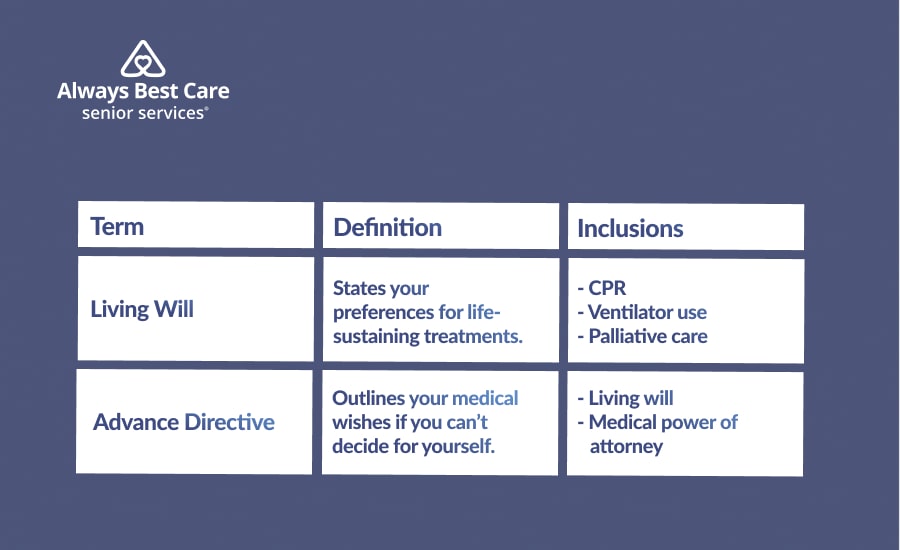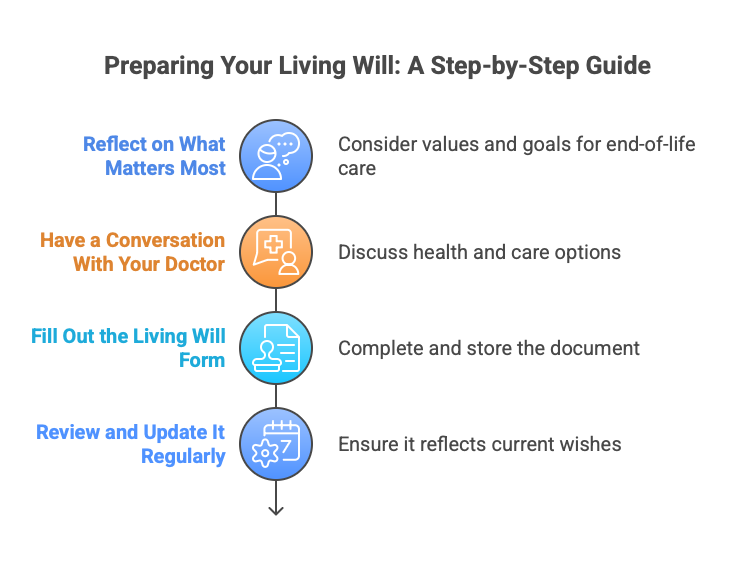What Is a Living Will? Advance Directive Comparison & FAQs

Table of Contents
What Is a Living Will? Key Takeaways
- A living will contains your medical treatment wishes if you can’t make decisions for yourself
- If you’re approaching the end of life and wish to decline certain treatments, you can specify if you want to stop using specific medical devices
- You don’t need an attorney to draft a living will
As your loved one ages, there might come a time when important healthcare decisions need to be made on their behalf.
Yet, it’s startling to learn that only 45% of Americans have a living will in place, a legal document that outlines an elderly individual’s wishes for emergency treatment if they’re unable to make decisions themselves.
A living will specifies the medical treatments they’re willing to receive or decline, along with specific conditions.
In this guide, we will:
- Explore what decisions a living will covers
- Explain the key benefits of having a living will
- Clarify how a living will differs from an advance directive, so you can understand how both documents work together
What Decisions Does a Living Will Cover?
A living will allows you to express your wishes about life-sustaining treatments if you’re terminally ill or permanently unconscious and unable to speak for yourself.
For instance, you can specify whether to turn off specific devices if you’re nearing the end of life and choose to waive certain interventions.
Think about where you stand for the following:
1. CPR (Cardiopulmonary Resuscitation)
CPR is a critical emergency procedure that restores the heartbeat when it suddenly stops.
It typically involves forceful chest compressions and rescue breaths and might also include electric shocks or medications to restore a normal heartbeat.
While it can be effective in younger, healthier people, CPR is less successful in frail older adults due to underlying conditions and a lower chance of full recovery.
2. Ventilator Use
If you can’t breathe on your own, doctors might use a ventilator to help. Doctors place a tube down your throat (intubation) to deliver air to your lungs, often using sedation to ease discomfort.
Also known as a breathing machine or respirator, medical teams use ventilators in hospitals to assist patients with respiratory failure or those undergoing surgery.
3. Pacemakers and Implantable Cardioverter-Defibrillators (ICDs)
Pacemakers help regulate heart rhythm, while implantable cardioverter-defibrillators (ICDs) deliver shocks to correct abnormal rhythms.
While both can be lifesaving, your living will can specify if you want them deactivated to avoid aggressive treatment near the end of life.
4. Artificial Nutrition and Hydration
If you can’t eat or drink, fluids and nutrition can be delivered through an IV or a feeding tube.
Feeding tubes are inserted through the nose for short-term use. For long-term nutritional support, they’re surgically placed directly into the stomach.
Hand-feeding is another option. It’s often considered a gentler and potentially safer approach, particularly for individuals with dementia.
5. Palliative Care
Palliative care is specialized medical support aimed at improving the quality of life for individuals facing serious illnesses, including chronic, terminal, or life-limiting conditions, as well as for their families.
It focuses on easing pain and other distressing symptoms while also providing emotional and psychological support.
Palliative care aims to help individuals live as fully and comfortably as possible, no matter their diagnosis or stage of illness.

Key Benefits of a Living Will
Here’s what a living will can do for you and your loved ones.
1. Ensures Your Medical Wishes Are Honored
A living will legally document your specific medical preferences, such as receiving life support, resuscitation, artificial nutrition, or pain relief, to ensure your treatment aligns with your values even when you’re unable to speak for yourself.
2. Minimizes Stress
When you clearly state your wishes, you lift a heavy burden from your loved ones.
It gives them clarity during emotional moments, helps avoid guilt or conflict, and ensures your care reflects your values.
3. Allows You To Choose Care That Aligns With Your Values
A living will gives you the power to say no to aggressive treatments that don’t reflect your values if you’re unconscious or unable to decide, allowing you to choose comfort-focused care if that’s what you prefer.
Living Will vs. Advance Directive
A living will is a type of advance directive that lets you highlight which medical treatments, procedures, and medications you want or prefer to avoid.
On the other hand, an advance directive is a legal document that outlines your preferences for medical care in case you can’t speak for yourself.
Health care providers rely on these instructions if you’re ever incapacitated and unable to communicate your wishes, such as during a coma, stroke, advanced dementia, or serious illness that impairs your ability to speak or make decisions.

How To Prepare a Living Will
If you’re ready to put your wishes in writing, these steps can help guide the process:
1. Reflect on What Matters Most
Start by considering your values and goals for end-of-life care.
Ask yourself questions, such as:
- If my heart stopped or I couldn’t breathe, would I want to be resuscitated?
- Would undergoing aggressive treatment be worth it if I could recover enough to enjoy time with my family?
Some people prioritize staying alive as long as possible, especially if there’s a meaningful event ahead, like a wedding or birth.
Others feel strongly about avoiding prolonged suffering. Considering what’s most important to you can guide the choices you include in your living will.
2. Have a Conversation With Your Doctor
Medicare covers discussions about advance care planning as part of your annual wellness visit, and many private insurers do as well.
Talking with your doctor helps you understand your current health and what decisions might lie ahead.
For instance, if you have high blood pressure, your doctor can explain what could happen if it leads to a stroke and what care options you might experience.
You can also bring your health care proxy with you to the appointment to help you process information and talk through your options.
3. Fill Out the Living Will Form
You can download free, state-specific living will forms online.
Make sure to follow your state’s requirements, which might include having the form notarized or signed by witnesses.
After filling it out, store the original in a safe but accessible place, and share copies with your health care proxy and primary care provider.
4. Review and Update It Regularly
Your preferences might shift over time.
Revisit your living will at least once a year or after major life changes, like a move, a serious diagnosis, or a divorce, to ensure it still reflects your current wishes.

Discover Empathetic Senior Care at Always Best Care
If you’re facing a serious illness and can’t speak for yourself, a living will can help make sure your care reflects your values and wishes.
At Always Best Care, we know that navigating senior care decisions can feel overwhelming.
If you’re planning to draft a living will or a power of attorney, we’re here to guide you every step of the way with compassionate support and trusted resources to help you make informed choices for your loved one.
Here’s how we can help:
- In-home care: We provide 24/7 support for daily needs, including companionship, meal prep, medication reminders, light housekeeping, and personal care like bathing, dressing, and grooming.
- Skilled home health care services: In select areas, our licensed caregivers and aides partner with families to create personalized care plans that support both medical and emotional needs.
- Specialized home care services: We offer more than basic care, providing social interaction and health monitoring in the comfort of your loved one’s home.
- Respite care services: Our respite care gives family caregivers time to recharge while ensuring loved ones receive attentive, high-quality care, whether for a few hours or several days.
- Dementia care services: We offer thoughtful, individualized care for those living with dementia, focusing on comfort, safety, and dignity.
- Senior living referral services: Finding the right community can be a challenge. We help match your loved one with senior living options that align with their care needs, financial situation, and location preferences.
- Veterans assistance program: We’re proud to support veterans with quality care and help navigate the benefits they’ve earned.
What Is a Living Will? FAQs
When does a living will take effect?
A living will becomes effective when you are no longer able to communicate your healthcare decisions, typically in situations involving terminal illness, permanent unconsciousness, or severe cognitive decline.
Should I update my living will if I move to another state?
Yes, you should update your living will if you move to another state, as each state has its own laws about living wills and other advanced care documents.
While most doctors will honor out-of-state forms, check that your living will meets local legal requirements when you move to a new state.
Do minor children need living wills?
No, minors don’t need living wills. Parents or legal guardians automatically have the authority to make medical decisions for children under 18.
Once your child turns 18, they should consider drafting a living will, especially if they live away from home.





